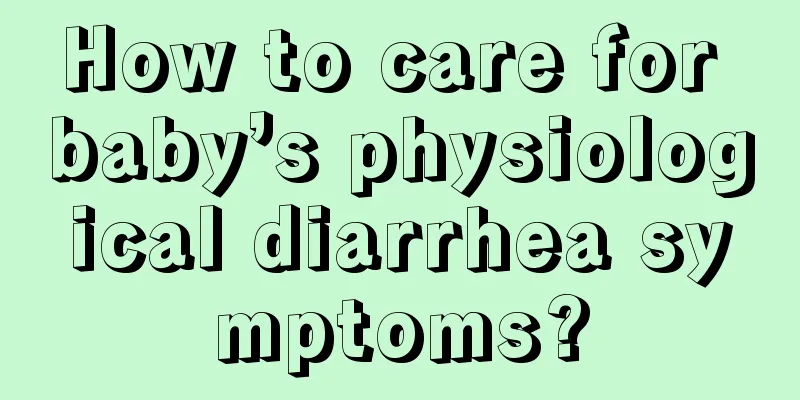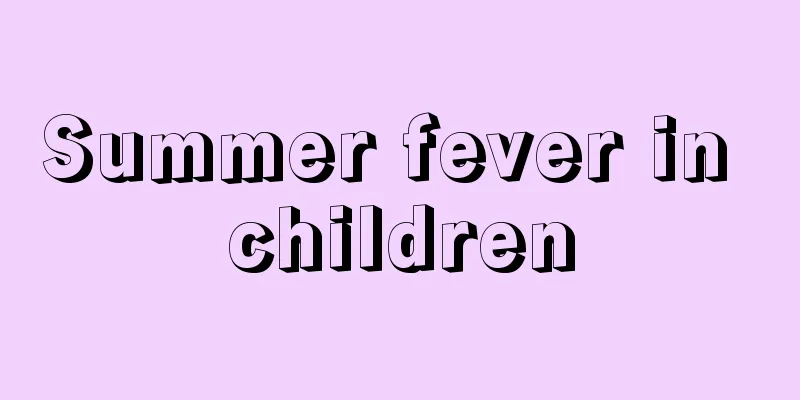How to care for baby’s physiological diarrhea symptoms?

|
Clinically, diarrhea is mainly divided into physiological diarrhea and pathological diarrhea. Many babies are prone to diarrhea due to physical reasons. For babies with physiological diarrhea, we must pay attention to care in daily life. The symptoms of each child are different and have certain degrees of severity. So what are the symptoms of physiological diarrhea in babies? How should I care for it? 1. Mild symptoms: The number of bowel movements per day is less than 10 times, the stool is yellow-green, contains mucus, and sometimes contains a small amount of water, but the amount is not much, accompanied by mild abdominal distension and hyperactive bowel sounds. Occasionally there is a small amount of vomiting or regurgitation, loss of appetite, normal body temperature or occasional low fever, slightly pale complexion, good spirits, and no other systemic symptoms. The clinical symptoms of dehydration are not obvious, the course of the disease is about 3-7 days, and the prognosis is good. 2. Severe cases: Diarrhea is frequent, with dozens of bowel movements a day. The stool is watery or egg drop soup-like, large in volume, and has a sour and smelly odor, accompanied by galactorrhea or vomiting. In severe cases, the patient may vomit coffee-colored substances, accompanied by fever, irritability, drowsiness, listlessness, and even coma and convulsions. Some patients may experience obvious dehydration, acidosis, and electrolyte imbalance, such as hypokalemia or hypocalcemia. 3. Treatment: After diarrhea begins, you should control your diet appropriately to reduce the burden on the gastrointestinal tract and allow the digestive tract to get some rest. Although fasting is not necessary, you should choose to feed easily digestible food. For babies with severe diarrhea, water should be replenished in time to prevent dehydration. Oral rehydration salts can be used. Provide good care to control intestinal and extraintestinal infections and prevent further development of the disease. Children with severe diarrhea should be sent to the hospital for examination and treatment in time. |
<<: What is the reason why babies have milk curds?
>>: Can hydrocephalus in newborns be treated?
Recommend
How to make sausages as baby food?
There are many ways to prepare baby complementary...
What to do if your two-month-old baby cries at night
Two-month-old babies crying at night often troubl...
What is the reason for a child's swollen instep?
The phenomenon of edema of the instep usually occ...
What are the symptoms of capillary hemangioma in children?
The incidence of hemangioma is increasing, especi...
How to treat adenoid hyperplasia in children
Children are the flowers of the motherland and th...
Six-month-old baby has small red bumps on his face
As 6-month-old babies gradually begin to add vari...
Can I get a vaccination for a low-grade fever?
Many people think that low fever is caused by inf...
What are some good ways to reduce fever in children?
If a child has a fever, parents will help the chi...
What to do if your child has a viral cough
Parents are naturally worried about children'...
Why is the newborn's face a little yellow?
Speaking of neonatal jaundice, everyone should be...
What are the benefits of soaking your feet in soda water?
We all learned chemistry when we were in school. ...
What causes dry eyes in children?
Children will have dry eyes when they are very yo...
What to do if your child suddenly coughs in the middle of the night
What should we do if our child suddenly coughs in...
Heel blood screening method
Many people feel unfamiliar when they see heel bl...
What are the hazards of smog to children?
Haze is quite harmful to children, because their ...









